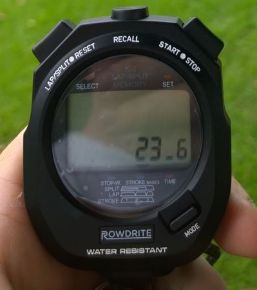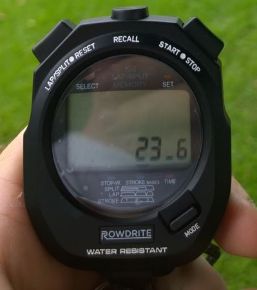AKA: The Jockey, Coach on Water, The brains, The driver, and many more!
In my opinion the most important person in the boat, is the cox'n. (No I was a bow-man so I don't have any bias here).
And one the most important things any cox can do is to make the right calls at the right time. This means it is vital at the critical moment that the voice of the cox'n doesn’t falter.
I was recently approached by a fellow coach who had one of her cox'ns with an issue. On multiple occasions this particular cox had lost his voice through races, and as the season approached the final series, this coach was concerned about the overall health of her athletes. After a few discussions, and an outing or two with the crew, we realised it was possibly a bit too late to do anything in the given time frame. And it was a concern as we rapidly approached a weeklong event called nationals and we could see this was going to be the rowing equivalent of a train crash.
I went away and thought, from my observations there was nothing I could see that would cause the loss of the voice, could it be stress or other environmental factors? I decided to travel to the upcoming regatta and observe the crew on race day. I was trying to figure out if there was something (diet, routine, dehydration) that might be the cause of the issue.
It was about the 3rd race of the day that I had my epiphany, as I watched each crew stretch, jog, and warm up, all without the cox. The cox of all the crews I watched stayed with the coach going through the race plan, tactics, calls and planned pushes. The crew went out, and like clockwork the cox'n lost their voice through the second half of the semi's, they were starting to get stressed and concerned that they would be dropped, yet they were one of the best tacticians in a boat that I had seen for a while. Again I went away and thought.
I caught up with the cox to discuss this situation with them away from the pressure of the shed, the crew and coach, without prying I tried to find out if their home life was ok, had there been any recent traumatic events, lifestyle changes, work issues or anything. They had assured me that nothing was going on, that might put them under any extra levels of stress. Again I went away and thought.
Then early one morning (about 2am to be precise) I had the epiphany that I didn't realise I had had earlier. It might seem weird and really left field, but a few days later I met up with them again, I sat him down and had a chat, ok I spoke he listened. I recommended that he go and take some singing and drama lessons, (I had actually already signed him up at the university club he just didn't know it yet).
I did this not because I thought his voice was so angelic that he belonged on stage or anything to try and embarrass him. I did it to provide him with some discipline. I hear you all screaming - he gets up at 4am 3-4 times a week to sit in a boat, and you think he doesn't have discipline???
Not quite, I know he has discipline and dedication, why else would he have put up with the pain like this for so long otherwise, I sent him to get some discipline around his voice, and more importantly to learn how to warm up his vocal chords. After signing him up for the lessons (and hearing him agree to do them) I spoke with the singing tutor of the class I signed him up for, and set out with her what I hoped to achieve with this young fellow, at which point she removed him from her class roll, and arranged for some private lessons free of charge (provided she got an invite and recognition at the end of year rowing dinner), I agreed and the following week our young athlete was off to singing twice a week for an hour each time. after only 3 weeks, the difference was amazing, this young fellow had learnt how to prepare his vocal chords for the straining that he is about to inflict on them, and the feedback for the other athletes in the boat was encouraging as well, he isn't screaming at them as much, but is projecting his voice without having to strain as much; and this had a further knock on effect of the crew were responding to his commands better. I was so astonished with the change and such a rapid response that I then approached the singing tutor/mentor/coach/instructor (I'm not quite sure what their actual title is), and I discussed with them the possibility of doing some sessions with all of the coxes. It took a bit of convincing for most of the coxes to attend (and take seriously) the vocal classes that they now must take. I was quite surprised to learn just 3 regattas later that the coxes were actually now doing vocal warms-ups normally reserved for opera singers and it is quite funny if you catch them at a regatta.
As I mentioned the change in the way that this athlete uses his voice is quite considerable, now I’m not saying he would rival any stage performer or someone who has been singing for years, but compared to what was to what has become is quite noticeable. And I can only attribute this to 2 things, one his willingness to take the lessons seriously and see them for what they were, as an attempt to help his situation and his pain, I will not deny that he was quite dubious at first, but once I explained why, he seemed a little more willing. The second is the understanding of the singing tutor, understanding that this was not someone who was interested in becoming a professional singer nor someone who wanted to learn how to sing properly, in correct pitch, just someone who used their voice to do what they love and that they needed her help.
The true test came several weeks after the first lesson, unfortunately on the morning of a major regatta we had another cox'n fall ill, leaving us down a cox. We had confidence in putting our new invigorated athlete forward, which he performed his rostered races, and substituted for a further 3. when it came time to load the trailer and head home, here he was still able to talk (albeit a little squeaky) but without the pain, prior to his race he had wandered off as the rest of the crew stretched and joked, and he proceeded with lip rolls, bubbles and the like. He thanked me for my assistance, and promised to continue the classes for a little longer. I was buoyed by the fact that we had identified an issue and assisted in solving it. We didn't remove it completely as he did still have some loss of voice at the end of the day, but it was certainly an improvement on where he had been just a few months earlier. I was glad to see that he went on to win the final for the eights in the championships, even if it did mean they beat my true clubs crew. But I don't look at it of they won, we lost, I see it that as a rowing community we were able to band together to help those we have in our care, as a coach I NEVER like seeing an athlete injured in anyway, and if I can see that they are doing something incorrect I will correct it, no matter what club. I wish the best for this athlete and hope that his dedication and willingness will take him far in the sport, for many of us they can see the potential within, and I am glad to say that I have helped to make his success last a little longer, the rest is up to him to see how far he can take it, but who knows, it is an olympic year after all.
I have taken this to heart, and now I insist that any cox'n I coach has to undergo vocal training with a singing teacher, and they must perform vocal warmups before a race (no matter how minor the race is). I have found that from this the control of thier voice that my cox's have through a race especially a close race has improved, and inturn this can bring out a improved response from the athletes.
So I leave it there by asking you what warm-up and training does your cox'n perform?










